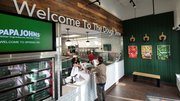News
A goldmine of history
January 24, 2006
It's the question every operator asks in the morning: "I wonder what business will be like today?"
Many won't know that answer until the end of the day, while others who've recorded their business's activities for years can reference journals or computer files. Still others will simply push a button and let their POS system explain in detail how busy they were a year ago and for weeks prior and after.
"Having that kind of history available and the planning tools to use it gives our managers a lot of information to make good decisions," said David Henderson, vice president of field technologies for Capital Pizza, a 97-unit Pizza Hut franchisee in Wichita, Kan. The company just completed a 25-store test of Speedline Solutions' 5.5 POS software release. "I can see what business was like on this same day last year, and it'll let me look at all the days and weeks around this same day."
Henderson's system not only supplies sales data, but labor hours expended in every position, numbers of all items sold and production pars. The system also encourages managers to add notes about each day, tidbits that explain why that date was exceptionally busy or slow.
|
Other POS systems he has used also stored historical information, but none provided so much detail, he said. The data he now has at hand prepares his managers to make pinpoint labor and sales expectations.
"This allows me to make a sales forecast not only for the day, but for lunch and dinner separately," he said. "At lunch I can even forecast how much of my traffic is going to be dine-in, carryout and delivery. That really helps when it comes to scheduling my labor."
Real data, not vague memories
According to Speedline marketing director Jennifer Wiebe, POS data warehousing provides "real numbers, not estimates. You're not going off your memory of what really happened." Hard data, not vague recollection, she said, "allows operators to plan as efficiently as possible."
It also ensures that information remains in-house and with the company, she said. Too often such knowledge is stored in the mind or the notebook of a manager who leaves to work elsewhere. "When it's in your POS, it's not written down in somebody's handwriting others can't understand."
POS systems' marketing tools typically are credited with generating the greatest return on investment, but Henderson said his system's ability to reduce costs plays at least an equal role.
"For somebody going from not having a POS at all to using a system with this planning tool, the savings would be significant," he said. "When you can shave just one point off food cost, it's huge in most businesses. And I'm sure you can do more than that with this system. That alone would easily pay for it."









